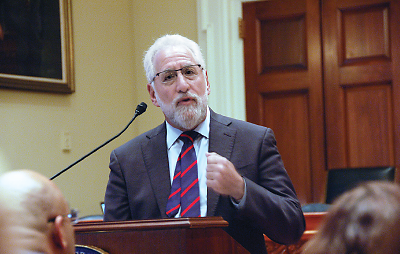Counties Seek Help to Reduce Numbers of Mentally Ill Inmates
Abstract
“Something is wrong when we use the criminal justice system as a mental health system,” Sen. Al Franken (D-Minn.) said at a Capitol Hill briefing in December.
America’s county governments, straining under the burden of caring for inmates with mental illness housed in their jails, couldn’t agree more.

Sen. Al Franken declares that “the intersection of mental health and the justice system is not a partisan issue.”
About 2 million people with serious mental illnesses are booked into jails each year, and the counties—and their taxpayers—must provide them with treatment. Yet even as the numbers devastate local jail budgets, outcomes are rarely improved, according to the National Association of Counties (NACo) and the Justice Center of the Council of State Governments (CSG), which organized the briefing.
While 5 percent of people in the general population have a serious mental illness, 17 percent of those booked into U.S. jails do. Within that population, 31 percent of the women and 15 percent of the men have serious mental illness, said Fred Osher, M.D., director of Health Systems and Services Policy at the CSG Justice Center in Washington, D.C. Furthermore, of those with a mental illness, 72 percent have a co-occurring substance use disorder.
This population is at greater risk at every stage of the criminal justice process, said Osher: “They are arrested in disproportionate numbers, stay longer in jail, have higher recidivism rates, and have less access to health care than those without mental illness.”
Tackling the problem is hampered by the constant churning of individuals in and out of jails and by a consequent lack of baseline data against which to test interventions, said Osher. “Plus, the workforce in jails is not well trained for mental health care and so needs new skills and cross-training.”
“We need to make a change,” agreed Judge Steven Leifman, J.D., of the 11th Judicial Circuit of Florida in Miami and a member of the American Psychiatric Foundation’s (APF) Board of Directors. Leifman has worked closely with APF through the Judges’ Leadership Initiative for Criminal Justice and Behavioral Health to increase court officials’ understanding of mental illnesses and the ways to respond to people with them.

Fred Osher, M.D., stresses that “crime rates are dropping, but the percentage of people with mental illness in jails is increasing.”
“The issue affects every county in the nation,” added Rep. Richard Nugent (R-Fla.), a former sheriff of Hernando County, Fla., at the same briefing. Nugent cosponsored the Justice and Mental Health Collaboration Act of 2013, intended to reduce the number of individuals with mental illness in county jails. Franken introduced similar legislation in the Senate. The bills will be refiled in the new Congress.
In addition to seeking help from the federal government, counties must gather teams of local leaders not only from corrections departments but from the legal, mental health, medical, social service, and law enforcement communities, said Osher. Collecting prevalence data and formulating needs assessments are critical, as is evaluating available treatment systems and their capacity. Finally, implementing evidence-based interventions must be followed by closely tracking outcomes.
Those interventions can include crisis intervention training for police, diversion programs like mental health courts, better access to community-based treatment, and improved prerelease planning before jail inmates return to their communities.
“Mental health in the justice system is not a partisan issue,” concluded Franken, urging grassroots support for the pending legislation.
“I don’t always agree with Al Franken, but we do agree on this issue,” said Nugent, a conservative Republican. “I’m optimistic we’ll get this done. It’s important to the people back home.”
Toward that goal, NACo and the CSG Justice Center will join the APF at a summit of county officials and others later this year to discuss and disseminate best practices used by counties that have already developed plans for coping with the crisis. ■



